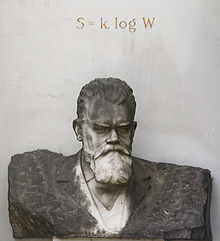Boltzmann brain
This article includes a list of general references, but it lacks sufficient corresponding inline citations. (August 2011) |

A Boltzmann brain is a hypothesized self-aware entity which arises due to random fluctuations out of a state of chaos. The idea is named for the physicist Ludwig Boltzmann (1844–1906), who advanced an idea that the known universe arose as a random fluctuation, similar to a process through which Boltzmann brains might arise.
Boltzmann brain paradox
Boltzmann brains are often referred to in the context of the "Boltzmann brain paradox" or "problem". They have also been referred to as "Boltzmann babies".[1]
The concept arises from the need to explain why we observe such a large degree of organization in the universe. The second law of thermodynamics states that the total entropy in a closed universe will never decrease. We may think of the most likely state of the universe as one of high entropy, closer to uniform and without order. So why is the observed entropy so low?
Boltzmann proposed that we and our observed low-entropy world are a random fluctuation in a higher-entropy universe. Even in a near-equilibrium state, there will be stochastic fluctuations in the level of entropy. The most common fluctuations will be relatively small, resulting in only small amounts of organization, while larger fluctuations and their resulting greater levels of organization will be comparatively more rare. Large fluctuations would be almost inconceivably rare, but are made possible by the enormous size of the universe and by the idea that if we are the results of a fluctuation, there is a "selection bias": we observe this very unlikely universe because the unlikely conditions are necessary for us to be here, an expression of the anthropic principle.
If our current level of organization, having many self-aware entities, is a result of a random fluctuation, it is much less likely than a level of organization which only creates stand-alone self-aware entities. For every universe with the level of organization we see, there should be an enormous number of lone Boltzmann brains floating around in unorganized environments. In an infinite universe, the number of self-aware brains that spontaneously randomly form out of the chaos, complete with false memories of a life like ours, should vastly outnumber the real brains evolved from an inconceivably rare local fluctuation the size of the observable universe.
The Boltzmann brain paradox is that any observers (self-aware brains with memories like we have, which includes our brains) are therefore far more likely to be Boltzmann brains than evolved brains, thereby at the same time also refuting the selection-bias argument.
See also
Notes
- ^ "Boltzmann babies in the proper time measure". eScholarship. 2008-07-14. Retrieved 2011-08-22.
References
- "Disturbing Implications of a Cosmological Constant", Lisa Dyson, Matthew Kleban, and Leonard Susskind, Journal of High Energy Physics 0210 (2002) 011 (at arXiv)
- "Can the universe afford inflation?", Andreas Albrecht and Lorenzo Sorbo, Physical Review D 0 (2004) 063528 (at arXiv)
- "Is Our Universe Likely to Decay within 20 Billion Years?", Don N. Page, (at arXiv)
- "Sinks in the Landscape, Boltzmann Brains, and the Cosmological Constant Problem", Andrei Linde, Journal of Cosmology and Astroparticle Physics, 0701 (2007) 022 (at arXiv)
- "Spooks in Space", Mason Inman, New Scientist, Volume 195, Issue 2617, 18 August 2007, Pages 26-29
- "Big Brain Theory: Have Cosmologists Lost Theirs?", Dennis Overbye, New York Times, 15 January 2008
